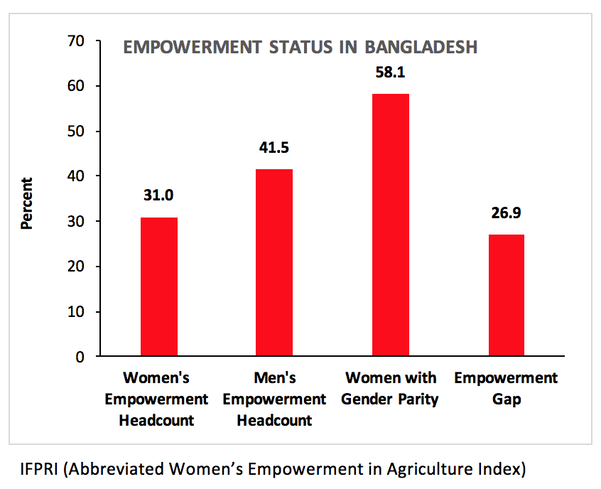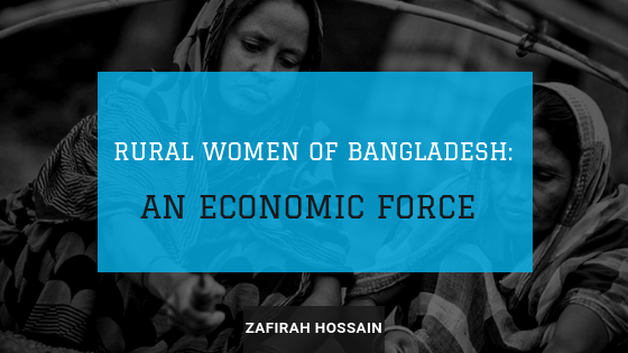ECONOMICS STUDY CENTER, UNIVERSITY OF DHAKA
|
Almost 70% of Bangladeshi women live in rural areas and evidently face several harsh conditions such as poor access to healthcare, hygienic living quarters, education, secure credit and wages and so on. Yet these women are the very driving force of their local economies and their contributions are rarely recognized. What they lack in literacy they make up for in the form of practical skills and hard work, which begs the question ‘what economic feat could these women achieve if equipped with education and appropriate technology?’  It’s imperative to acknowledge that these women are largely self-employed and involved in the agriculture sector. They are not only heavily involved in the production of crops, cattle and poultry rearing, fishing and shrimp culture, honey making and jute etc, they also work in processing these raw materials into finished goods i.e. dairy and milk products, molasses blocks, jute bags. Moreover, in recent years, it is common to see women opening small restaurants, provide tailoring services and other home-based shop-keeping. They also use environmentally sustainable materials such as bamboo, cane, jute, cotton from waste RMG to make products like baskets, canes, vegetable dyed garments and quilts. Somehow, a lot of this work is not recognized as ‘economically active employment’ in national accounts (ESA Working Paper 2011). This may not be a very reliable assumption; indeed these activities are critical to rural economic growth. To say they are not economically active would undermine their small but self-established industries and enterprises. Surely they are contributing to the national output, and much of their production is often exported i.e. fish and handicrafts. Not only does it lower our unemployment rate, but it may also increase our GDP and help in the correction of our international trade deficit in the long run. They are able to provide themselves and their families with an improved standard of living and become financially independent. They may even pursue an education with their earnings or put their children through school. Thus, the benefits of their work may extend to the future of Bangladesh and contribute to a more skilled workforce. These women are the unacknowledged backbones of their communities and they singlehandedly generate jobs, incomes, and growth. However, statistically speaking there is not enough female employment in rural areas. Food and Agriculture Organisation of the UN (FAO) calculates that if women farmers (43 percent of the agricultural labor force in developing countries) had the same access as men, agricultural output in 34 developing countries would rise by an expected average of up to 4%. This could reduce the number of undernourished people in those countries by as much as 17%, reducing to approximately 150 million hungry. In Bangladesh, the issue may not be lack of food production but there is a deficit in affordability. Especially in rural areas where women are expected to take up traditional gender roles and completing secondary education is often not an option, women are likely to be financially insecure. And without an earning husband, they may not be able to consume basic necessities. The cycle of poverty may continue to thrive and a large pool of untapped resources may be wasted. When planning macroeconomic objectives for the future of Bangladesh, the economic empowerment of rural women should be of great importance. The best way to start accomplishing this may be through ensuring secondary education for all girls coupled with more access to technology. They can utilize these skills to participate in large-scale manufacturing and/or service industries in their areas which would help industrialize Bangladesh further. In Zimbabwe, along one of the poorest stretches of the Zambezi River, new equipment and training offered by UN Women have helped women from the Tonga ethnic group break into the male-dominated fishing industry. Instead of selling fish purchased from men’s boats, they now market their own catch. Sales have doubled, and the women are organizing collectives, extending their market reach to larger towns and cities, and participating in a revolving fund providing small loans. Credit schemes and job centers designed to cater to rural women with capital, information and guidance should also be encouraged. For instance, a survey of microcredit financing by BRAC yielded results showing that women are the vast majority of constituents and are less likely to default than men. Furthermore, the impact on household consumption doubled when the borrowers were women. There should be more emphasis on implementing supply-side policies such as training and subsidizing small female-owned firms as there is substantial evidence that they provide productive input in our country’s economy. The main aim should be to allow rural women to enter the mainstream labor force and earn wages equal to their male counterparts. It is a loss to society and the economy if we do not reap the benefits of growth from giving men and women equal footing. Adequate investment and easing obstacles faced by women may allow Bangladesh to be propelled towards greater economic development. Zafirah HossainZafirah Hossain is a 12th grade student of Sunbeams School. When she's not busy trying to make sense of the world through economics, she enjoys debating and writing.
0 Comments
Leave a Reply. |
Send your articles to: |


